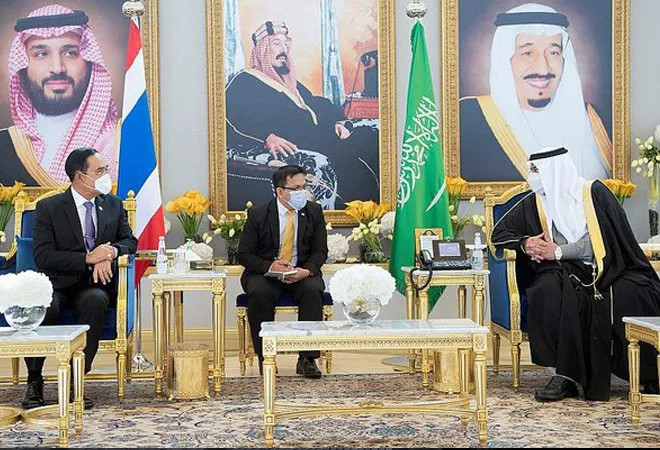
In a major turn of events, the relations between Thailand and Saudi Arabia have taken an upward swing after a gap of more than three decades. The negotiation came as Thai Prime Minister, Prayuth Chan-o-cha, visited Saudi Arabia in January 2022. This marked the highest-level meeting between the two nations since the Blue Diamond Affair took place in 1989-1990 that severed the bilateral ties between the two. The Saudi Arabian diplomats relegated their political ties with Thailand over this burglary which led to a string of murders, baffling both the nations.
Currently, the progressive Saudi Prince Mohammed bin Salman Al Saud, has agreed to let bygones be bygones. In the meeting held on 25 and 26 January, both sides reiterated normalising relations and initiating a new era of friendship. The Thai government’s sincere regret and hope to establish friendly relations have been instrumental in forging new ties. The countries are gearing towards collective investments in the fields of tourism, energy, and petrochemicals.
Brief history
The infamous Blue Diamond Affair of 1989 had a detrimental effect on the relations between the two nations. A precious 50-carat blue diamond amongst an estimated US $20 million worth of precious stones and jewellery was filched by a Thai janitor from the Saudi royal palace when the Prince and his wife were on holiday. While the Thai officials eventually claimed they had captured the thief, strange things continued to happen thereafter. The diamonds sent to Saudi officials turned out to be forged; subsequently, in February 1990, Thai gunmen shot and killed three Saudi diplomats in Bangkok who had been trying to find the diamonds. A Saudi businessman who had travelled to Thailand to investigate the case of the missing diamonds was kidnapped and is thought to be dead since his body was never recovered.
The tale brought to the fore the misuse of authority and power that is entrenched within the Thai police system. There were speculations that the stones and jewellery were retained by the senior officials. The case remains unsolved to date.
This turned the relations sour between the two nations to the point that there is no Thai ambassadorial position in the embassy in Riyadh. Visas were stopped being issued for millions of Thai workers. Thousands of Thai Muslims were not issued permits for their annual visit to Mecca. Moreover, citizens were cautioned against travelling to Thailand.
Till 2021, an authorisation letter has been required by the Thai government from the people travelling to Saudi Arabia for official or personal business. Tourism was not promoted and abuse of the same entailed penalties or jail time. The number of pilgrims from Thailand visiting Mecca was decisively constrained.
A change in relations
Thailand has long-awaited to patch the relations. The important turning point took place when Saudi Arabia changed its administrative structure and passed power on to the young generation, who look forward to expand relations that will help diversify its oil-dependent economy.
Prince Mohammed has progressively won allies abroad. He has restored relations with regional rivals, including Pakistan, Iran, Qatar, and Turkey. Thailand is the latest addition to the list.
Thus, at the significant meet in January this year, the Thai side reaffirmed that they will exert utmost effort to resolve the cases if new well-founded evidence appears. The Thai government reiterated their pledge to provide proper security to the royal members of Saudi Arabia during their stay in Bangkok. Together they committed to safeguarding the other nationals while they reside in each other’s nation.
Opportunities
There have been a number of agreements signed during the meeting, a significant one has been the labour cooperation deal. During 1980s, Saudi Arabia was a sought-after destination for Thai workforces, where more than 300,000 of them lived and earned their livelihood. At present, approximately less than 1,400 individuals are working in the menial labour force.
Following the recent development, the Thai Overseas Manpower Association has stated that a small team of workers will be sent to Saudi Arabia within two months. They will be monitored and if they adapt successfully to the new environment, then a fresh batch of workers will be sent.
Secondly, the resumption of diplomatic relations also revives cooperation in the tourism sector, with the Tourism Authority of Thailand (TAT) preparing to launch a tourism marketing campaign to attract Saudi tourists. The Thai authorities are concentrating on promoting and building on two outstanding areas of medical and shopping tourism. In 2017, a total of 33,517 Saudi nationals visited Thailand, but numbers dropped to 4,125 and 467 in 2020 and 2021 respectively due to the COVID19 pandemic. In a new stance, direct flights from Saudi Arabia to Thailand are available from 28 February while Thai International Airways also plans to have direct flights between Bangkok and Riyadh from May.
Thai tourism authorities have set a lofty goal of 20 billion baht from an expected 200,000 Saudi tourists in 2022. Roadshows are in the offing to introduce and showcase services in Thailand. Plans are underway to know customers in Saudi Arabia that will help create comprehensive services to cater to their needs.
While these instances hold importance, trust needs to be rebuilt. The loss of faith has been costly for both sides. The generosity of Saudi money in Southeast Asia, especially with Indonesia and Malaysia, is well received and thus shows an increase of support of the Saudi Kingdom. Bangkok needs to recalibrate its strategy to create better opportunities, aligning its plan with Saudi Vision 2030. The Saudi Vision 2030 emphasises reducing the reliance on oil and is hoping to expand its economy through developing the education, health, and tourism sectors. Thailand can play a key role in this and thus, should not miss the opportunity.
The views expressed above belong to the author(s). ORF research and analyses now available on Telegram! Click here to access our curated content — blogs, longforms and interviews.




 PREV
PREV


